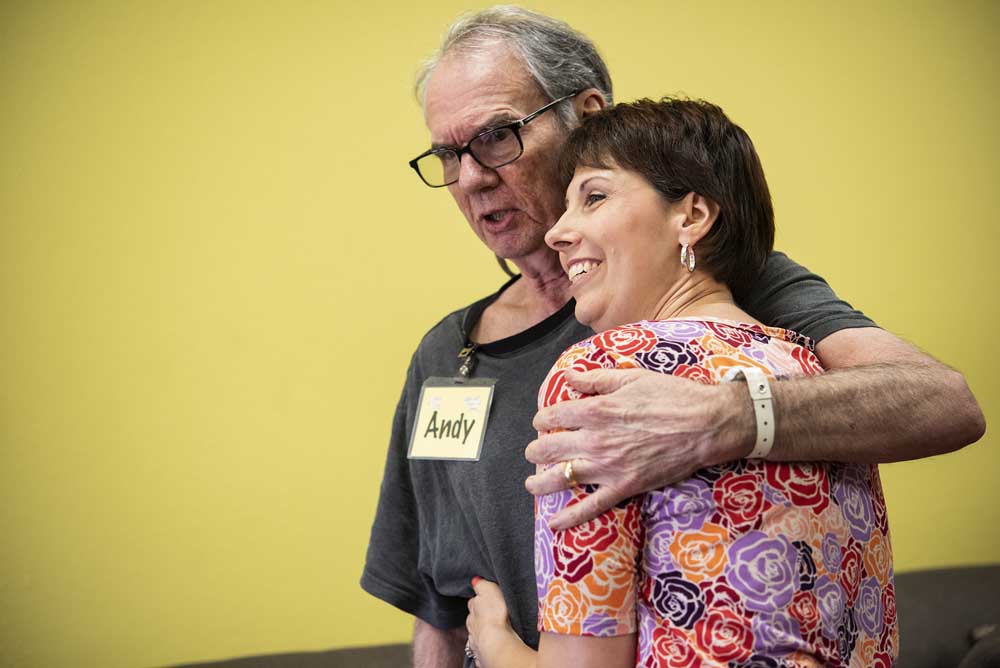Alzheimer’s Alliance of Smith County receives grant to help caregivers locate wandering loved ones
Published 8:30 am Friday, October 11, 2019

- Andy Yelverton wears a location bracelet as he hugs Jaime Huff, Alzheimer’s Alliance of Smith County program director, while attending the Alzheimer’s Alliance of Smith County’s day program for adults with dementia or Alzheimer’s Disease on Thursday. The Alzheimer’s Alliance received a grant for the Project Lifesaver program, which uses the bracelets or anklets to locate those with dementia who wander.
Roughly 6 in 10 people with dementia will have the dangerous symptom of wandering, according to the Alzheimer’s Association.
With the help of a tracking program called Project Lifesaver at the Alzheimer’s Alliance of Smith County and a recent grant, local caregivers can feel safer by knowing where their loved one is.
Trending
The local alliance was one of the recipients of a $5,000 grant for this program from the Alzheimer’s Foundation of America. The organization was the only group from Texas and one of 10 grantees across the country.
With Project Lifesaver, the dementia patient receives a bracelet that puts out a unique radio tracking signal. If the person goes missing, the caregiver notifies the Alzheimer’s Alliance of Smith County, which will then work with the Smith County Sheriff’s Office and Tyler Police Department to send the officers to the wanderer’s location.
Jamie Huff, Alzhiemer’s Alliance of Smith County Project Lifesaver program director, said the grant will be used to purchase more bracelets and help more people buy into the program.
“We want everyone with dementia who is mobile to have a Project Lifesaver bracelet,” she said. “They need a Project Lifesaver because the risk of wandering is so high. Radio signal will transmit from anywhere.”
The alliance gathers information about the patient from the caregiver to learn possible locations the person may wander off. Volunteers will change the bracelet batteries every 60 days as well, Huff said.
Alzheimer’s Foundation of America Communications Director Chris Schneider said the program helps to cut location time down significantly.
Trending
“This is a great program and we’re very happy to help them expand that,” Schneider said. “They will be able to double the number of people served and obtain additional technology for more families to be a part of the program.”
Huff said the radio technology in the bracelets is tried and true as opposed to GPS or cellphone tracking. Less than 30 people are a part of the program now.
“It’s a great program and we need more people to utilize it,” Huff said.
According to Project Lifesaver International, the program has already rescued 3,600 wanderers.
Schneider stressed the great safety Project Lifesaver provides, as wandering is such a common and hazardous part of Alzheimer’s and dementia.
“They may not even realize they’re lost. It’s such a dangerous behavior. That’s why this program is so critically important,” Schneider said. “The wandering individual does not know they’re in danger and it becomes difficult to find them because of their dementia.”
According to the Alzhiemer’s Foundation of America, wandering can come from an unmet need or want for purpose. The individual could leave because they think they should go to work when they’re retired.
To enroll with the Smith County Project Lifesaver program, call the office at 903-509-8323.
For more information regarding symptoms, visit the alzfdn.org. For the foundation helpline, call 866-232-8484.






